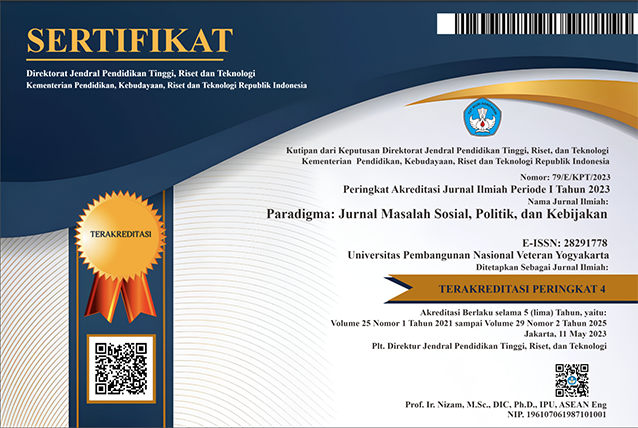Examining Indonesia's Nickel Downstream Policy Through Securitisation Theory
DOI:
https://doi.org/10.31315/paradigma.v29i1.14299Keywords:
Nickel Downstream, Securitisation, Indonesia.Abstract
Indonesia's nickel downstream policy represents a strategic shift in its natural resource governance, characterized by its focus on adding value to raw nickel through domestic processing. We propose a securitisation/resource security framework to perspective to understand Indonesia's nickel downstream policy. Securitisation of natural resource is a process in which the government frames natural resources as an existential threat to state interests, which varies in nature and is highly dependent on certain conditions. This policy arises when natural resource problems can have an impact on economic security, regime security and/or geopolitical problems in a country. From the perspective of securitisation, the nickel downstream policy is one of the Indonesian government's responses to the perception of threats to economic security, regime/government security and security from geopolitical threats that arise both from the domestic and international levels. The research reveals that the Indonesian government has strategically employed securitization narratives to justify the measures, such as the export ban on raw nickel. These narratives highlight the critical role of nickel in driving economic growth, securing regime legitimacy, and navigating geopolitical competition in the context of the global clean energy transition. By integrating insights from securitisation theory, this study contributes to a deeper understanding of how natural resources are constructed as security issues in developing economies. It underscores the need for balancing economic and geopolitical ambitions with environmental and social considerations, offering a framework for analysing resource policies amid global energy transitions and shifting geopolitical dynamics.
References
Abdurrachman, F. (2023). Assessing nickel downstreaming in Indonesia. East Asia Forum.
Ali, S. H., Giurco, D., Arndt, N., Nickless, E., Brown, G., Demetriades, A., Durrheim, R., Enriquez, M. A., Kinnaird, J., Littleboy, A., Meinert, L. D., Oberhänsli, R., Salem, J., Schodde, R., Schneider, G., Vidal, O., & Yakovleva, N. (2017). Mineral supply for sustainable development requires resource governance. Nature, 543(7645), 367–372. https://doi.org/10.1038/nature21359
Antaranews.com. (2024). Bahlil: Hlirisasi nikel beri nilai tambah perekonomian 10 kali lipat. Antaranews.Com. https://www.antaranews.com/berita/4226207/bahlil-hlirisasi-nikel-beri-nilai-tambah-perekonomian-10-kali-lipat
Arandito, S. (2024). Merusak Lingkungan, Hilirisasi Industri Nikel Perlu Dievaluasi. Kompas.Id.
Balzacq, T. (2005). The Three Faces of Securitization: Political Agency, Audience and Context. European Journal of International Relations, 11(2), 171–201. https://doi.org/10.1177/1354066105052960
Balzacq, T. (2010). A theory of securitization: Origins, core assumptions, and variantsTitle. In T. Balzacq (Ed.), Securitization Theory (1st ed., pp. 1–30). Routledge.
Bazilian, M. D. (2018). The mineral foundation of the energy transition. The Extractive Industries and Society, 5(1), 93–97. https://doi.org/10.1016/j.exis.2017.12.002
Buzan, B., Waever, O., & Wilde, J. de. (1998). Security: A New Framework for Analysis. In International Journal (Vol. 53, Issue 4). Lynne Rienner Publishers. https://doi.org/10.2307/40203739
Castillo, R., Blumenthal, L., & Purdy, C. (2022). Indonesia’s electric vehicle batteries dream has a dirty nickel problem. Brooking Institute.
Climate Rights International. (2024a). Indonesia: Huge Nickel Project Driving Climate, Rights, Environmental Harms Indigenous Peoples, Local Residents Facing Threats, Land Grabbing, Air and Water Pollution. https://cri.org/indonesia-huge-nickel-project-driving-climate-rights-environmental-harms/
Climate Rights International. (2024b). Nickel Unearthed The Human and Climate Costs of Indonesia’s Nickel Industry.
Commission, E. (2022). WTO panel rules against Indonesia’s export limitations on raw materials. European Commission. https://ec.europa.eu/commission/presscorner/detail/en/ip_22_7314
Ericsson, M., & Löf, O. (2019). Mining’s contribution to national economies between 1996 and 2016. Mineral Economics, 32(2), 223–250. https://doi.org/10.1007/s13563-019-00191-6
Floyd, R. (2016). Extraordinary or ordinary emergency measures: what, and who, defines the ‘success’ of securitization? Cambridge Review of International Affairs, 29(2), 677–694. https://doi.org/10.1080/09557571.2015.1077651
Floyd, R. (2019). The Morality of Security. Cambridge University Press. https://doi.org/10.1017/9781108667814
Friends of Earth. (2022). CEO Elon Musk and the shareholders of Tesla Inc. 1 Tesla Road Austin, TX 78725 USA. Friends of Earth. https://foe.org/wp-content/uploads/2022/07/2022.07.25_Letter-to-Tesla-re-nickel-mining_WALHI.pdf
Guild, J. (2023). Indonesia Wants More than a Nickel for Natural Resources. East Asia Forum.
Heinrich, A., & Szulecki, K. (2018). Energy Securitisation: Applying the Copenhagen School’s Framework to Energy. In Energy Security in Europe (pp. 33–59). Springer International Publishing. https://doi.org/10.1007/978-3-319-64964-1_2
IMF. (2023). IMF STAFF COUNTRY REPORTS. https://www.imf.org/en/Publications/CR/Issues/2023/06/22/Indonesia-2023-Article-IV-Consultation-Press-Release-Staff-Report-and-Statement-by-the-535060
Indonesia.go.id. (2023). Nilai Ekspor Hilirisasi Nikel Melonjak 745%. Indonesia.Go.Id. https://indonesia.go.id/kategori/editorial/7255/nilai-ekspor-hilirisasi-nikel-melonjak-745?lang=1
Indonesia Should Dictate Global Prices of Nickel, Coal: Minister Bahlil. (2024). Tempo.
Judge, A., Maltby, T., & Szulecki, K. (2018). Energy Securitisation: Avenues for Future Research. In Energy Security in Europe (pp. 149–173). Springer International Publishing. https://doi.org/10.1007/978-3-319-64964-1_6
Kantor Kepresidenan RI. (2024). Presiden Jokowi: Hilirisasi Nikel dan Sumber Daya Alam Jadi Kunci Peningkatan Ekonomi Nasional. https://www.presidenri.go.id/foto/presiden-jokowi-hilirisasi-nikel-dan-sumber-daya-alam-jadi-kunci-peningkatan-ekonomi-nasional/
Kemensetneg. (2023). Sambutan Presiden Joko Widodo pada Pengukuhan Pengurus Dewan Pimpinan Nasional APINDO Masa Bakti 2023-2028. Kementerian Sekretariat Negara. https://www.setneg.go.id/baca/index/sambutan_presiden_joko_widodo_pada_pengukuhan_pengurus_dewan_pimpinan_nasional_apindo_masa_bakti_2023_2028
Kuzemko, C. (2014). Politicising UK energy: what ‘speaking energy security’ can do. Policy & Politics, 42(2), 259–274. https://doi.org/10.1332/030557312X655990
O’Neill, A. (2024). Indonesia: Growth rate of the real gross domestic product (GDP) from 2019 to 2029 (compared to the previous year). https://www.statista.com/statistics/320068/gross-domestic-product-gdp-growth-rate-in-indonesia/
OECD. (2020). OECD Investment Policy Reviews: Indonesia 2020.
Peh, G. (2024). Indonesia’s nickel companies: The need for renewable energy amid increasing production.
Pidato Presiden RI pada Sidang Tahunan MPR RI. (2023). Sekretariat Kabinet RI. https://setkab.go.id/pidato-presiden-ri-pada-sidang-tahunan-mpr-ri-dan-sidang-bersama-dpr-ri-dan-dpd-ri-dalam-rangka-hut-ke-78-proklamasi-kemerdekaan-ri-di-gedung-nusantara-mpr-dpr-dpd-ri-senayan-provinsi-dki-jakarta/
Ramadhan, A., & Kristian, E. (2020, June 24). UU Minerba Dinilai Jadi Bukti Pemerintah Tak Berpihak pada Lingkungan dan Rakyat. Kompas.Com.
Ramli, R. R., & Pratama, A. M. (2023). IMF Minta RI Cabut Larangan Ekspor Nikel, Menko Airlangga: Kolonialisme Baru Dilakukan dengan Cara Itu. Kompas, 27 Juni.
Ross, M. L. (1999). The Political Economy of the Resource Curse. World Politics, 51(2), 297–322. https://doi.org/10.1017/S0043887100008200
Sachs, J. D., & Warner, A. M. (2001). The curse of natural resources. European Economic Review, 45(4–6), 827–838. https://doi.org/10.1016/S0014-2921(01)00125-8
Setiawan, V. N. (2023). RI Kalah Gugatan di WTO, Mendag Zulhas Siapkan Jurus Ini. Kemendag.Go.Id. https://www.kemendag.go.id/berita/pojok-media/ri-kalah-gugatan-di-wto-mendag-zulhas-siapkan-jurus-ini
Shofa, J. N. (2023, October 3). Indonesia Defends Nickel Appeal amids WTO’s Appelate Body Crisis. The Jakarta Globe.
Tempo.co. (2023, August 8). Economist Says 90% of Downstream Nickel Profits Flow to China. Tempo.Co.
The Economist. (2023, January). Indonesia embraces resource nationalism. The Economist. https://www.economist.com/asia/2023/01/26/indonesia-embraces-resource-nationalism
US Geological Survey. (2024). Nickel Statistics and Information. https://www.usgs.gov/centers/national-minerals-information-center/nickel-statistics-and-information
Warburton, E. (2014). In Whose Interest? Debating resource nationalism in Indonesia. Kyoto Review of Southeast Asia, 15. https://kyotoreview.org/yav/in-whose-interest-debating-resource-nationalism-in-Indonesia/
Warburton, E. (2017). Resource nationalism in Indonesia: Ownership structures and sectoral variation in mining and palm oil. Journal of East Asian Studies, 17(3), 285–312. https://doi.org/10.1017/jea.2017.13
Warburton, E. (2018). Our Resources, Our Rules: A Political Economy of Resource Nationalism in Indonesia [Australian National University]. https://doi.org/10.25911/5d67b49938e3a
Warburton, E. (2019). Nationalism, developmentalism and politics in Indonesia’s mining sector. In A. Patunru, M. Pangestu, & M. C. Basri (Eds.), Indonesia in the New World (pp. 90–108). ISEAS–Yusof Ishak Institute Singapore. https://doi.org/10.1355/9789814818230-011
Warburton, E. (2023). Resource Nationalism in Indonesia. Cornell University Press. https://doi.org/10.7591/cornell/9781501771965.001.0001
Wicaksana, I. G. W. (2021). Economic nationalism for political legitimacy in Indonesia. Journal of International Relations and Development, 24(1), 27–50. https://doi.org/10.1057/s41268-019-00182-8
Williams, P. D. (Ed.). (2008). Security Studies. Routledge. https://doi.org/10.4324/9780203926604
Wilson, J. D. (2017). International Resource Politics in the Asia-Pacific The Political Economy of Conflict and Cooperation. Edward Elgar Publishing.
Wilson, J. D. (2019). A securitisation approach to international energy politics. Energy Research & Social Science, 49, 114–125. https://doi.org/10.1016/j.erss.2018.10.024
Downloads
Published
How to Cite
Issue
Section
License
The manuscript submitted to Paradigma: Jurnal Masalah Sosial, Politik, dan Kebijakan journals are released under the license of Creative Commons Attribution-Non Commercial- ShareAlike (CC BY SA) if and when the article is accepted for publication.
We declare that:
- This paper has not been published in the same form elsewhere.
- It will not be submitted anywhere else for publication prior to acceptance/rejection by this Journal.
- A copyright permission is obtained for materials published elsewhere and which require this permission for reproduction.
Retained Rights/Terms and Conditions
Authors retain all proprietary rights to the published works, such as (but not limited to) the following rights:
- Copyright and other proprietary rights relating to the article, such as patent rights,
- The right to use the substance of the article in own future works, including lectures and books,
- The right to reproduce the article for own purposes,
- The right to self-archive the article
The right to enter into separate, additional contractual arrangements for the non-exclusive distribution of the article's published version (e.g., post it to an institutional repository or publish it in a book), with an acknowledgment of its initial publication in this journal Paradigma: Jurnal Masalah Sosial, Politik, dan Kebijakan



